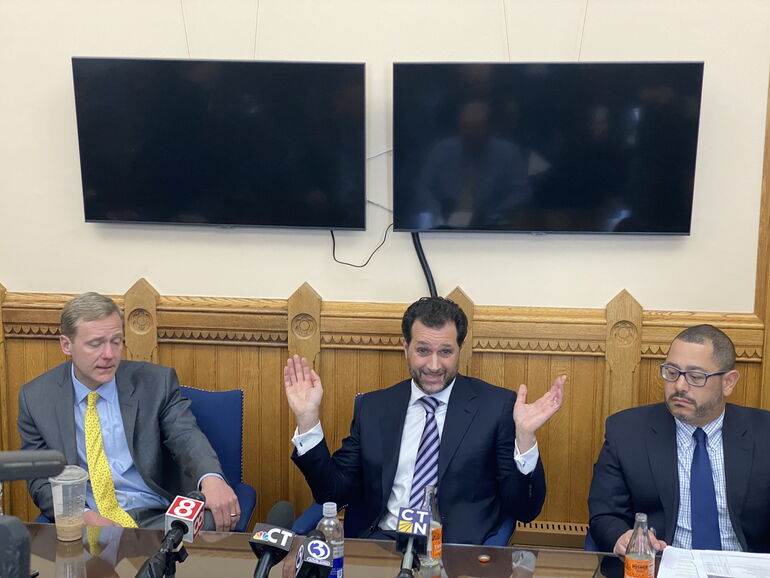Processing Your Payment
Please do not leave this page until complete. This can take a few moments.
-
News
-
Editions
-
- Lists
-
Viewpoints
-
HBJ Events
-
Event Info
- 2024 Economic Outlook Webinar Presented by: NBT Bank
- Best Places to Work in Connecticut 2024
- Top 25 Women In Business Awards 2024
- Connecticut's Family Business Awards 2024
- What's Your Story? A Small Business Giveaway 2024 Presented By: Torrington Savings Bank
- 40 Under Forty Awards 2024
- C-Suite and Lifetime Achievement Awards 2024
- Connecticut's Health Care Heroes Awards 2024
-
-
Business Calendar
-
Custom Content
- News
-
Editions
View Digital Editions
Biweekly Issues
- April 29, 2024
- April 15, 2024
- April 1, 2024
- March 18, 2024
- March 4, 2024
- February 19, 2024
- February 5, 2024
- January 22, 2024
- January 8, 2024
- + More
Special Editions
- Lists
- Viewpoints
-
HBJ Events
Event Info
- View all Events
- 2024 Economic Outlook Webinar Presented by: NBT Bank
- Best Places to Work in Connecticut 2024
- Top 25 Women In Business Awards 2024
- Connecticut's Family Business Awards 2024
- What's Your Story? A Small Business Giveaway 2024 Presented By: Torrington Savings Bank
- 40 Under Forty Awards 2024
- C-Suite and Lifetime Achievement Awards 2024
- Connecticut's Health Care Heroes Awards 2024
Award Honorees
- Business Calendar
- Custom Content
Revamped cannabis bill would let package stores sell THC seltzers; hemp farmers left out again
 HBJ Photo | Skyler Frazer
State Rep. Mike D'Agostino speaks during a press conference with House leadership.
HBJ Photo | Skyler Frazer
State Rep. Mike D'Agostino speaks during a press conference with House leadership.
A new version of a major cannabis bill in the General Assembly would allow package stores to sell low-dose THC seltzers, a loophole many operators have already been taking advantage of and was initially targeted for elimination.
House Bill 5150 was introduced and approved by the General Law Committee before undergoing several recent changes. A new version of the bill, referred by the House on Tuesday to the legislature's Finance, Revenue and Bonding Committee, now defines an “infused beverage” as a non-alcoholic beverage containing up to 3 milligrams per container of Tetrahydrocannabinol (THC), the psychoactive compound found in cannabis.
The bill allows these drinks to be available in cannabis dispensaries and package stores that pay the state’s annual fee for the right to sell infused beverages. The 3MG limit is lower than the typical 5MG per container that’s become somewhat of a standard in the industry for single-dose cannabis products, experts said. As a result, the bill gives vendors a window to sell their existing 5MG products before phasing them out.
Initially, the bill was set to restrict the sale of THC seltzers and other THC products to dispensaries only, closing an existing loophole in the law that has allowed the products be sold in package stores, gas stations and other businesses without a cannabis license.
State Rep. Mike D’Agostino (D-Hamden) said Tuesday that the bill and language related to THC infused beverages is “still in discussion.”
The revised legislation also addresses concerns from hemp and CBD vendors, who complained that the original bill would have essentially prevented them from selling their products legally. Now, the bill says moderate-THC hemp product vendors can register with the state Department of Consumer Protection (DCP) for the right to sell manufactured hemp products with up to 5MG of THC per container.
Hemp farmers and cannabis cultivators
The revised bill released Monday also removes language that would have potentially made it easier for some cannabis companies to find business locations. The original bill allowed social equity entrepreneurs, specifically those with disproportionately impacted area (DIA) cultivator licenses, to locate their facilities outside a DIA zone, while still contributing money to that designated area. The language would have paved the way for Connecticut’s hemp growers to partner with social equity applicants struggling to find a place to locate their businesses.
Amanda Rositano, co-founder and CEO of women-owned and led cannabis company Soulstar, said she wants the legislature to help companies like hers who have paid the $3 million fee for a DIA cultivator license but are struggling to find a space to open.
“We're currently running up against a number of barriers that this program has placed in front of social equity applicants, perhaps unintentionally, that make it very, very difficult to turn a Section 149 cultivator license into an actual business,” Rositano said at the state Capitol during the Connecticut Cannabis Chamber of Commerce’s Lobby Day this week.
Rositano, whose business is planning for an outdoor cultivation business, is hoping the state allows DIA cultivators to locate their businesses outside a state recognized DIA zone, but require the business to make direct financial contributions back to the area — specifically a percentage of the profits the business makes.
Remediation
The bill would also create a legal pathway for cannabis companies to remediate their marijuana flower after failed lab tests, something that’s been a controversial part of both medical and recreational markets nationwide.
Remediation includes exposing cannabis flower to processes including radiation, ozone gas, hydrogen peroxide or chlorine dioxide that can eliminate contaminants found in the plant, but critics argue that it allows growers a way to cover up mistakes.
H.B. 5150 would let companies submit a remediation plan to the DCP that, pending approval, would let them remediate their product and resubmit it to a lab for testing. If the product passes that round of testing, it could go to store shelves and be sold.

2022 Giving Guide
This special edition informs and connects businesses with nonprofit organizations that are aligned with what they care about. Each nonprofit profile provides a crisp snapshot of the organization’s mission, goals, area of service, giving and volunteer opportunities and board leadership.
Learn more
Subscribe
Hartford Business Journal provides the top coverage of news, trends, data, politics and personalities of the area’s business community. Get the news and information you need from the award-winning writers at HBJ. Don’t miss out - subscribe today.
Subscribe
2024 Book of Lists
Delivering Vital Marketplace Content and Context to Senior Decision Makers Throughout Greater Hartford and the State ... All Year Long!
Read Here-
2022 Giving Guide
This special edition informs and connects businesses with nonprofit organizations that are aligned with what they care about. Each nonprofit profile provides a crisp snapshot of the organization’s mission, goals, area of service, giving and volunteer opportunities and board leadership.
-
Subscribe
Hartford Business Journal provides the top coverage of news, trends, data, politics and personalities of the area’s business community. Get the news and information you need from the award-winning writers at HBJ. Don’t miss out - subscribe today.
-
2024 Book of Lists
Delivering Vital Marketplace Content and Context to Senior Decision Makers Throughout Greater Hartford and the State ... All Year Long!
ABOUT
ADVERTISE
NEW ENGLAND BUSINESS MEDIA SITES
No articles left
Get access now
In order to use this feature, we need some information from you. You can also login or register for a free account.
By clicking submit you are agreeing to our cookie usage and Privacy Policy
Already have an account? Login
Already have an account? Login
Want to create an account? Register
Get access now
In order to use this feature, we need some information from you. You can also login or register for a free account.
By clicking submit you are agreeing to our cookie usage and Privacy Policy
Already have an account? Login
Already have an account? Login
Want to create an account? Register






0 Comments